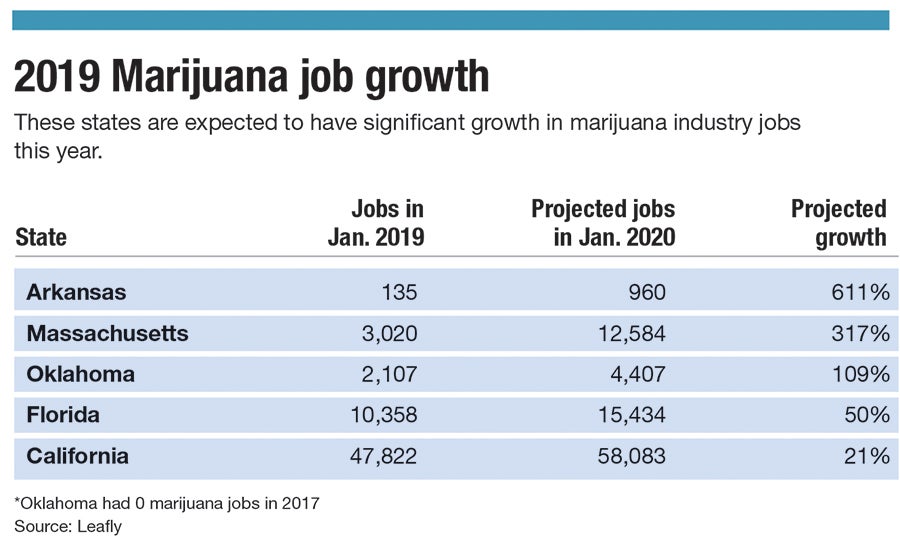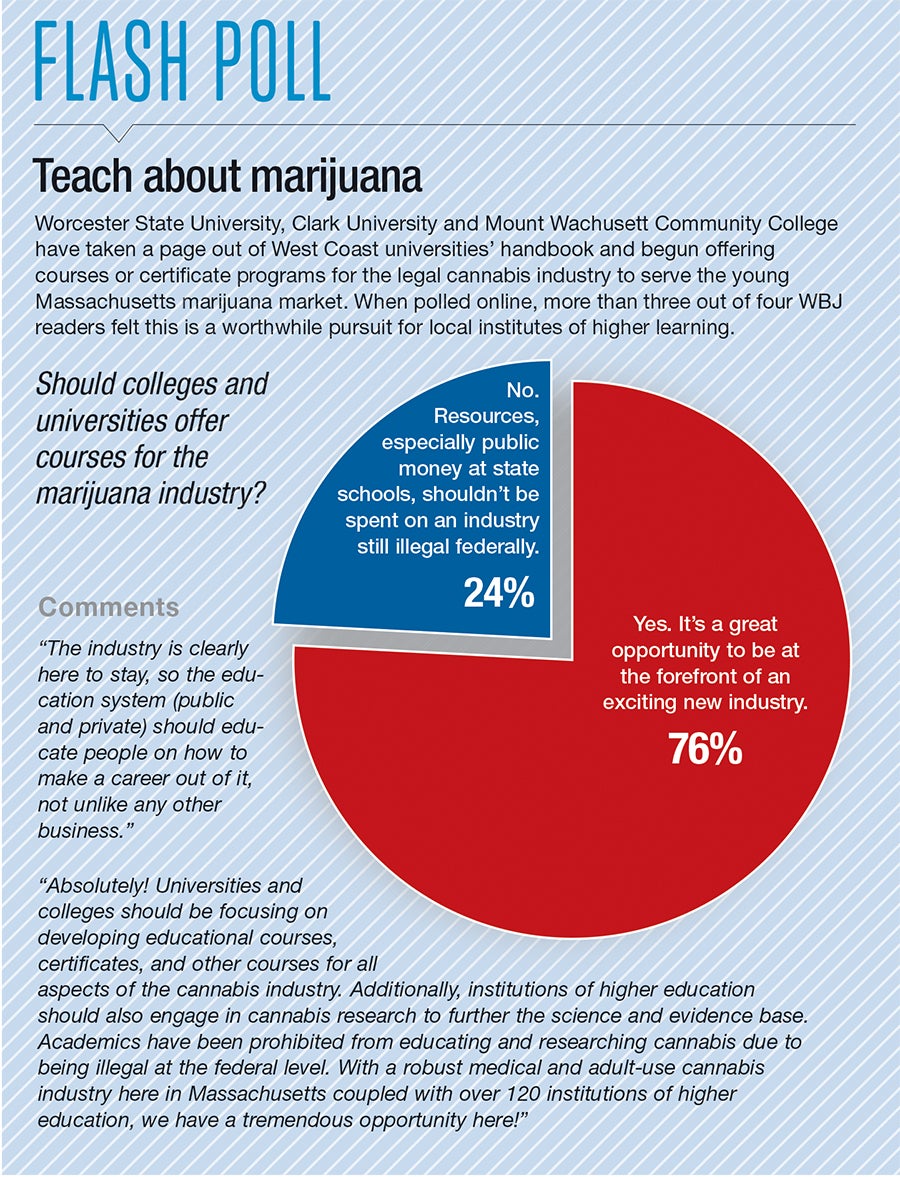Marijuana has been a part of college campuses for dozens of years, but the drug is now finding its way into the classroom, as Central Massachusetts educators are opening their doors to the cannabis industry.
The U.S. cannabis industry is valued at more than $12 billion and with Central Massachusetts having more marijuana business applications than anywhere else in the state, Greater Worcester colleges and universities are adapting to the demand for educated and qualified workers.
“What we do is meet the workforce development needs of the state,” said Rachel Frick Cardelle, vice president of the Mount Wachusett Community College Department of Lifelong Learning and Workforce Development. “This is clearly one of them.”
In Massachusetts, more than $260 million worth of recreational cannabis products have been sold in less than a year, according to the state Cannabis Control Commission. That’s even after a slow regulatory process where 23 stores opened in 10 months.
Now, weekly sales are expected to reach $2 million, and the industry has added 5,300 jobs and counting.

“I don’t want to say there’s a skills gap, but there’s an education and training gap,” said Sam Barber, president of Leicester marijuana retailer Cultivate.
Navigating the regulatory maze
With marijuana still considered illegal on the federal level, individual businesses needs to prove the merit of legal cannabis to potential host communities in Massachusetts.
Thanks to the first program of its kind, Clark University thinks it can help move those conversations along.
Beginning this month, the private Worcester university is offering a graduate certificate in cannabis control, taking a somewhat different approach from the handful of institutions now offering cannabis as a course.
Rather than focus on the business side of the conversation, the three-course, seven-week program focuses on cannabis enforcement, regulatory framework and health and safety of the new industry.
Cannabis entrepreneurs “are terrific at moving forward and advancing a whole range of issues, but the regulatory environment always lags that,” said John LaBrie, Clark University’s School of Professional Studies dean and associate provost for professional graduate education.
LaBrie cited examples like cannabis cafes, where the regulatory framework for public and social consumption is under discussion among the Massachusetts Cannabis Control Commission, as well as in other states with legal marijuana.
LaBrie said Clark fell into the program after the School of Professional Studies polled Worcester and other local towns about their most pressing issues for what was supposed to be an addition to the school’s masters in public administration.
With cities and towns going to great lengths to mitigate the impacts of the marijuana industry, cannabis quickly emerged as a possible topic, he said.
Enrollees span the gamut from people in the industry, lawyers, public officials and others looking for a career change and hoping to learn more about the regulatory requirements before pulling the trigger on a new business venture.
The course will focus on Massachusetts but will tackle the regulatory environment in the 11 states where the use and sale of cannabis has been made legal.

LaBrie hopes the course could help replicate the entrepreneurial energy of the cannabis industry to the regulatory side.
Startup costs for marijuana companies can soar to well above seven figures, but business models may not fit into the regulatory framework of any given state or municipality, he said.
However, those businesses entering the legal market typically want to stay in good standing with regulatory agencies, but frustrations can mount after months of expenses with no opportunity to begin selling products.
“That creates a prime place for a university to play a very active role in that conversation,” LaBrie said.
A national model
In 2016, the University of Denver billed itself as the first accredited university business school to offer a for-credit course on the business side of the marijuana industry, after school administrators saw a wide gap in education in cannabis as Colorado began allowing retail sales in 2014.
“That opens the gap for teaching, coursework and programs that might help the industry develop in a more professional way,” said Andrew Schnackenberg, an assistant professor at the university’s Daniels College of Business.
The program, open to both graduate and undergraduate students, was developed in house and utilizes the state’s status as the first in the U.S. to legalize recreational marijuana to rely on the expertise of those early entrepreneurs to help frame the coursework and participate in seminars and panels.
The coursework tackles distribution, mergers and acquisitions, and how to attract investors to an industry still labeled as risky.
“The basic function is to present, reach and explain some of the common frameworks you see in the cannabis space,” Schnackenberg said.
Other marijuana education programs have sprung up across the country, such as Northern Michigan University’s four-year undergraduate degree in medicinal plant chemistry and the University of Maryland School of Pharmacy’s graduate program in the science, therapeutics and policy surrounding medical cannabis. Oaksterdam University in Oakland, Calif. and Cannabis Training University in Colorado are institutions of higher learning founded directly to serve the needs of the marijuana industry.
The Colorado program in Gardner
The Cannabis Training University has begun working with Central Massachusetts educators to begin training the marijuana workforce. Mount Wachusett Community College in Gardner was the first to utilize the resources from CTU’s sister company Online Cannabis Education.
Via the third party provider, MWCC began offering the online non-credit, certificate course in early 2017.
The program offers the chance to obtain nine certificates in medical marijuana, cannabis business, budtender, cultivation, careers, cooking and extraction, master of marijuana, marijuana law and trimming.
Demand for the courses has been growing each month, said Frick Cardelle.
After rolling out in February 2017, the program had 18 students. Then, 43 signed up for the second year, and 37 have enrolled so far this year with four months to go.
Local companies hoping to enter the industry are working with MWCC to help onboard their staff via the program.
Stronger workforce pipeline
Worcester State University offered the same online program from the same vendor since last September, and like MWCC, wants to eventually grow the program and partner with local cannabis operators for hands-on learning opportunities.
With the potential for thousands of new jobs in Massachusetts essentially becoming a possibility in just a few years, Worcester State wanted to take a proactive approach to meet the demand, said Jeremiah Riordan, director of the Center for Business & Industry at the university.
“I saw this as a responsible thing to do,” Riordan said, equating the certificate to the Massachusetts Training & Intervention Procedures for Servers of alcohol certificate.
While many colleges and universities are still wary of for-credit courses or degrees in cannabis, the certificate can be a supplement to an accountant or chemist who graduated with a degree in those fields but isn’t quite ready to transfer those skills to the marijuana industry.
“This would make more viable candidates for the cannabis industry,” Riordan said.
Riordan and the university have had early conversations with Leicester marijuana retailer Cultivate about what a partnership would look like. The program could save young companies like Cultivate time and resources spent training new employees.

That’s especially true in Massachusetts, one of the most highly regulated cannabis markets in the country, said Barber of Cultivate.
“That’s where working with local schools would be a big benefit to everybody,” Barber said.

